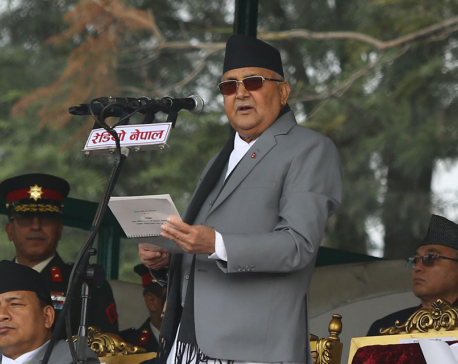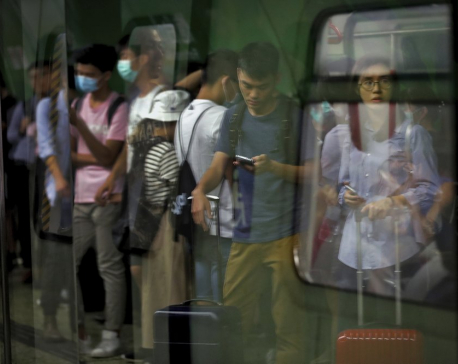
OR
People are protesting. Heed the people
Published On: June 17, 2019 02:00 AM NPT By: Republica | @RepublicaNepal
What looked like the beginning of protest-free times seems to be slipping away under the watch of the government and, to be fair, the government itself is inviting protests from various quarters by taking one after another controversial step. For many months, especially after the constitution promulgation and formation of governments in local, provincial and federal levels, protests and strikes were becoming almost rare. Now it increasingly looks like the country is headed toward various protests. A number of organizations and community groups are in the streets demanding revision of controversial bills and delivery of development works and good governance. Civil society bodies, some political parties, media and even constitutional bodies are protesting government’s moves. At least half a dozen civil society bodies, business groups, as well as government entities have come out with protest plans.
General people have also started protesting against the lack of government’s delivery in development. Few days back, locals living along Chabahil-Sankhu road took to the streets against the slow pace of blacktopping of the road. They withdrew only when the contractors resumed blacktopping work and promised to complete it as soon as possible. Hundreds of people from different areas of Kathmandu, Lalitpur and Bhaktapur staged a protest at Thapathali on Saturday, demanding early completion of Melamchi Water Supply Project. They took to the streets to exert pressure on the authorities to make safe drinking water accessible to all. Their protest is legitimate because the successive governments—including the current one—have promised to bring Melamchi water to Kathmandu households but Kathmandu residents are living with acute shortage of water. Even the underground water level is fast depleting. If underground water extraction continues unabated, experts have warned, Kathmandu might go completely dry in a few years. Melamchi project, therefore, has to be completed as early as possible and the government must mobilize all resources at its disposal for the purpose.
People are protesting because the government has failed on its basic duties to address their immediate needs, and, instead, looks bent on curbing free press and centralizing powers. When the strong government was formed under the leadership of Prime Minister K P Sharma Oli, there were hopes and expectations among people that the country was now headed to political stability and development. In the initial days, it had also taken some positive steps—such as the decision to end transportation syndicates and cartels and punishing the underperforming contractors. These good moves have not been implemented. Now almost every move of the government is becoming controversial, inviting more public resentment. Expediting the works of national pride projects and ensuring better public service delivery should be the priority agendas but, as things stand, these vital concerns have started to receive little attention from the government. When people protest against the party and leaders which they themselves voted to power, the ruling party and its leaders must understand that it is failing the people. The government must work according to people’s mandate and heed the people’s concerns, before these protests escalate into full-blown anti-government movement. People are warning the government through protests. It is time for Prime Minister Oli to reflect on where his government made mistakes and correct them. That time is now.
You May Like This

Stop protests, get back to the classrooms
Teachers working at community schools under government relief quota and at early childhood development centers (ECDCs) have been staging protests... Read More...

Democracy for the people
The Democracy Day that Nepal celebrates every year on Falgun 7 is becoming a ritual devoid of substance. ... Read More...

Protests disrupt Hong Kong work day as leader vows to remain
HONG KONG, Aug 5: Droves of protesters filled public parks and squares in several Hong Kong districts on Monday in a... Read More...







Just In
- NRB to provide collateral-free loans to foreign employment seekers
- NEB to publish Grade 12 results next week
- Body handover begins; Relatives remain dissatisfied with insurance, compensation amount
- NC defers its plan to join Koshi govt
- NRB to review microfinance loan interest rate
- 134 dead in floods and landslides since onset of monsoon this year
- Mahakali Irrigation Project sees only 22 percent physical progress in 18 years
- Singapore now holds world's most powerful passport; Nepal stays at 98th











Leave A Comment